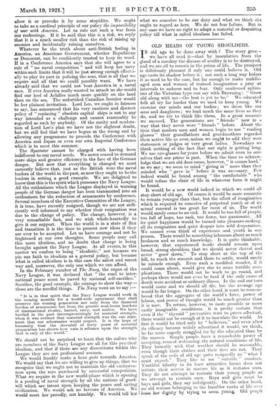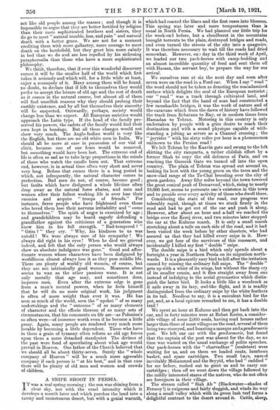OLD HEADS ON YOUNG SHOULDERS.
IS old age to be done away with ? The story goes-- we have all read it—that by inoculation from the gland of a monkey the disease of senility is to be destroyed, and we are all to remain in the prime of life. The prospect is deliriously pleasant if only one could believe it. Old age casts its shadow before it ; not such a long way before it as used to be the case, but far enough to make middle- aged men and women of trained imagination a prey at intervals to sadness and to fear. Only confirmed optim- ists of the Victorian type can say with Browning : " Grow old along with me—the best is yet to be." We educated folk all try far harder than we used to keep young. We exercise our minds and our bodies ; we dress like our sons and daughters ; we lead much the same lives as they do, and we try to think like them. In a groat measure we succeed. The generations are " friends " now in a way that they never were " friends " before. About the time that modern men and women begin to use " reading glasses " their grandfathers and grandmothers regarded their active life as over, unless, we ought to add, they were statesmen or judges or very great ladies. Nowadays we think nothing of the fact that our sight is getting long. We use eye-glasses for years before we admit even to our- selves that our prime is past. When the time to acknow- ledge that we are old does come, however, " it comes hard," as we say ; we seem to mind " giving in " more than they minded who " gave in " before it was necessary. Few indeed would be found among " the comfortable " who would refuse the elixir of life in whatever form it might be found.
It would be a new world indeed in which we could all stop short of old age. Of course it would be more romantic to remain younger than that, but the effort of imagination which is required to conceive of perpetual youth or of its actual renewal is too great for most of us. The world would surely come to an end. It would be too full of people, too full of hope, too rash, too fierce, too passionate. All its quiet happiness would be turned into pleasure-seeking, all its resignation and quiet despair into wild desperation. We cannot even think of experience and youth in one person. There would be something inhuman about so much freshness and so much knowledge. It is quite thinkable, however, that experienced heads should remain upon broad, strong shoulders, that we should never shrivel and never " grow down." To stop short at the top of the hill, to reach the summit and there to settle, would surely be miracle enough. Even such a modified wonder, if it could come about, would give rise to some terrible com- plications. There would not be work to go round, and perhaps there would not even be food if the only cause of death were accident or ordinary illness. In the end our turn would come and we should all die, but the average age would be far longer. On the other hand, it must be remem- bered that the aggregate of the world's force, power of labour, and power of thought would be much greater than it is now. To return, however, to more possible or more easily imaginable conditions, it is pretty certain that even if the " thyroid " preventive were to prove effectual, there would not be enough of it to inoculate the world. At first it would be tried only by " believers," and even after its efficacy became widely advertised it would, we think, be far more eagerly struggled for by the educated than by the masses. Simple people have a remarkable power. of accepting, even of welcoming, the natural conditions of life. They honestly wish that weather should be seasonable, even though their clothes and their fires arc not. They speak of the evils of old age quite resignedly as " what I must expect." They like to see " suitable " conduct. Youthful hilarity in its least attractive forms does not irritate their nerves in mature life as it irritates ours. They do not attempt to restrain their young people as we attempt to restrain ours. Boys and girls must be boys and girls, they say indulgently. On the other hand, no old woman belonging to the humbler ranks of life' ever loses her dignity by trying to seem young. Old people act like old people among the masses; and though it is impossible to argue that they are better fortified by religion than their more sophisticated brothers and sisters, they do go to meet "natural trouble, loss, and pain " and natural death with a better grace. We are not for a moment crediting them with more gallantry, more courage to meet death on the battlefield, but they greet him more calmly in bed than we do and are less repelled by his sickening paraphernalia than those who have a more sophisticated philosophy. We think, therefore, that if ever this wonderful discovery comes it will be the smaller half of the world which first takes it seriously and which will, for a little while at least, enjoy a monopoly of it. Many among them will be found, no doubt, to declare that if left to themselves they would prefer to accept the leisure of old age and the rest of death as it comes in the natural course, but almost all of them will find unselfish reasons why they should prolong their earthly existence, and by all but themselves their sincerity will be suspected. Outwardly, perhaps, society would change less than we expect. All European societies would approach the Latin type. If the head of the family pre- served his powers, the cadets of the family would find their own kept in bondage. But all these changes would not show very much. The Anglo-Indian world is very like the English, but there are no old white men in India. We should all be more at ease in possession of our vial of elixir, because one of our fears would be removed, but something would have been lost. The extreme end of life is often so sad as to take large proportions in the minds of those who watch the candle burn out. That extreme end, however, is in actual time often very short and never very long. Before that comes there is a long period in which, not infrequently, the natural character comes to perfection. Bad men do not, of course, become good ; but faults which have disfigured a whole lifetime often drop away as the natural force abates, and men and women after their fullest working life is over lose their enemies and acquire " troops of friends." For instance, fierce people who have frightened even those who loved them lose their nervous irritability and " come to themselves." The spirit of anger is exorcized by age ; and grandchildren may be heard eagerly defending a grandfather against the criticisms of a generation who knew him in his full strength. " Bad-tempered ? " " Grim ? " they cry. " Why, his kindness to us was untold We were always sure of his sympathy ! We always did right in his eyes I When he died we grieved indeed, and felt that the only person who would always show us absolute indulgence was gone." Good and affec- tionate women whose characters have been disfigured by worldliness almost always lose it as they pass middle life. There are plenty of worlXy old women,- of course, but they are not intrinsically good women. Meanness alone seems to wax as. the other passions wane. It is not only morally that age may, and sometimes does, improve men. Even after the extreme edge is gone from a man's mental powers, when he feels himself that he will do , no more original work, his judgment is often of more weight than ever it was. He has seen so much of the world, seen the " upshot " of so many undertakings and the " outcome " of so many elements of character and the effects thereon of so many sets of circumstances, that his comments on life are—as Polonius's so often were—of immense worth even if he become a little prosy. Again, many people are rendered very much more lovable by becoming a little dependent. Those who have in them a grain of tyranny often reform as old age forces upon them a more detached standpoint The divines of the past were fond of speculating about what age would prevail in Heaven. One father of the Church believed that we should all be about thirty-seven. Surely the " whole company of Heaven-" will be a much more agreeable company if each person is " at his best," and in that case there will be plenty of old men and women and crowds of children.



































 Previous page
Previous page